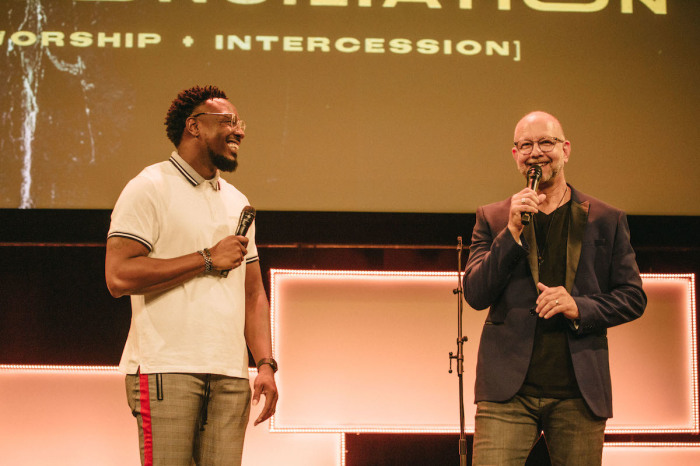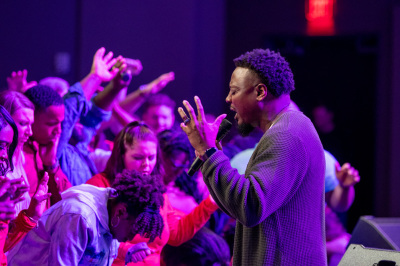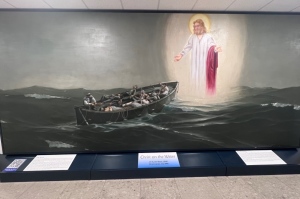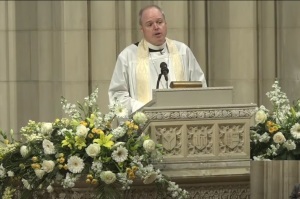‘Unity is the priority of Christ’: How a white congregation merged with a black one

In a time of deep racial tension in America, a middle-aged white pastor and a young black pastor — Jay Stewart and Derrick Hawkins — are sharing the story behind their unbreakable bond centered on their faith, which led them to combine their culturally segregated churches and become one.
The unlikely pair are leading the journey of racial reconciliation by example. In their new co-authored book, Welded: Forming Racial Bonds That Last, released by iDisciple this month, Stewart and Hawkins recount the two-year journey that led to the merging of Hawkins' African American church with Stewart’s predominantly white megachurch.
“In 2014, Pastor Derrick came to a service at The Refuge after seeing our campus in Salisbury, his hometown,” Stewart told The Christian Post of how their unique bond began. “He approached me that day about mentoring him and coaching him as he prepared to take over the role of senior pastor at The House of Refuge Deliverance Ministries in Greensboro, North Carolina.
Hawkins recalled, “My wife asked would I take my daughter to get her hair done, on a Saturday morning might I add, it was my typical rest day. I obliged her request! This trip led me to a sign in downtown Salisbury, North Carolina, where The Refuge had a campus extension.”
The church’s sign caught Hawkins’ attention and God would have it that the two would meet and begin a friendship and partnership that now can serve as an example for churches to follow.
The pastors began meeting monthly, during which they “established trust” and a “great friendship.” In 2016, they decided to go beyond the norm and merge their completely culturally different ministries. The House of Refuge became the fourth campus of The Refuge and Hawkins serves as campus pastor of that Greensboro location.
“It was a God thing; we just followed the leading of the Holy Spirit, and the outcome was a merger,” Hawkins commented. “Prayer led each step, decision, meetings and also many challenges. We talk about this a lot in our book.”
“We have always operated under a few key principles in forging relationships that will last,” Stewart added. “First, we seek to understand more than we seek to be understood. Second, we’ve learned to appreciate and not just tolerate our differences, leveraging them for the sake of the relationship. We know we are better together.”

Both men of God say it’s imperative that churches looking to merge follow the leading of the Holy Spirit.
“The established foundation has to be relational; we spent over a year and a half building the foundation of our friendship. That is where you learn and discern a person's motives and heart,” Hawkins emphasized. “From there, follow the leading of God and educate yourself as much as possible.”
The need for cultural diversity in the church is great and Stewart and Hawkins are not afraid to lead the charge despite having lost friendships and support as a result of it. In a recent radio program discussion, Stewart revealed that he lost church members after making the statement that “black lives matter.” Although the pastor, who has been in ministry for nearly two decades, does not agree with the core beliefs of the BLM organization, he said it was important his black congregants and friends knew he supported the phrase that their lives were of equal value.
Nearly a half-century after Martin Luther King Jr. called Sunday morning church “the most segregated hour in America,” the Equal Justice Initiative reported that 86% of American churches still lack any meaningful racial diversity.
In the 1993 book More Than Equals: Racial Healing for the Sake of the Gospel, co-author Chris Rice said the racial divide in the church has to be seen as a problem.
“Ninety percent of African-American Christians worship in all-black churches. Ninety percent of white American Christians worship in all-white churches … Years since the incredible victories of the civil rights movement, we continue to live in the trajectory of racial fragmentation. The biggest problem is that we don't see that as a problem,” Rice penned.
According to Michael O. Emerson, a sociologist who has been leading studies on race and religion, the percentage of multiracial congregations (having less than 80% of any single racial group) in the U.S. stood at 7.4% in 1998 but increased to 13.7% in 2010. A more recent Baylor University study found that by 2019, multiracial congregations grew to 16%.
Stewart grew up in Deep South Georgia or what he called “very racist Georgia.” Their merger was not only aesthetically different but culturally as well as they had to learn how to assimilate to different musical styles and upbringings.
“We live and see the church and the world through our lenses. Those lenses, whether we agree or not, can be biased,” Hawkins explained. “Biases sometimes produce barriers that can prevent things from moving forward.”
The young minister said preferences can also lead to “placing expectations on people they don't know because you never expressed them.”
“Throughout the process of us developing such a close relationship and modeling true racial unity, I’ve had to learn to be a better listener and I’ve been reminded that I can learn so much from people who are different than me,” Stewart reflected.
Hawkins considers Stewart his spiritual father despite the difference in their age, race and upbringing. He said Jesus is what bonds them together.
“I learned about submission, honor, and how to deal with conflict in a healthy way,” Hawkins told CP of how much Stewart has impacted his life. “I am continually telling people: ‘Honor has to be from your heart. I can't just say I honor you with words of affirmation but not have heart for you.’”
“We can't submit to people, races, church leadership if we have heart issues inadequately addressed,” he added, admitting that it’s all “still a learning process for me, and there is so much I'm still learning and areas that I'm growing in.”
Welded offers practical guidelines to help readers form authentic relationships with people who look different from them.
The founding pastor of The Refuge is convinced that the “devil seeks to keep us divided because unity is always a prerequisite for revival. But I also believe that fear is the great paralyzer, and many people are afraid to venture into uncomfortable places.”
Echoing the sentiment, Hawkins maintained, “It is easier to live in comfort than to challenge the cultural norms that seek to keep us divided. For some, church is a place of safety and community. For most African Americans, during slavery, blacks were not allowed to read, let alone be in the same worship spaces as whites. That division is still seen and felt throughout our churches today. From preaching styles, worship styles, and many other customs, this has remained a massive barrier to seeing our churches become multiethnic.”
The answer to ending the divide is to “be willing to embrace every ethnicity and their different expressions of worship,” Hawkins went on to say. “I believe we all add value to each other!”
Stewart cited Revelation 7:9, which describes a scene where people from every tongue, tribe, and nation will be gathered around the throne worshiping God. He stressed, “We are better together and I believe God’s original blueprint for the New Testament church never involved segregation.
“I believe the Church on earth should be a picture of Heaven on earth.”
Hawkins cited Acts 2 on why the Church was never meant to be segregated. He said the picture of the first church depicted in the Bible “is explicit in showing us the type of church that God desires us to have.”
“Jesus is returning for a multiethnic bride,” Hawkins contended. “We have to be careful that inferiority and superiority are not the blemishes found on the Church's garment. In the upper room, we see the unified bride of Christ, and in the moment, an outpour of the Holy Spirit, there we see the New Testament church established, and the Gospel spread across the world to every ethnicity. So a diverse church is in the heart of God. More so, a church appreciating each group's value and heritage is even more valuable and powerful.”
Both leaders believe that unity is possible.
“We talk in the book about the priority of Jesus found in John 17. We point out that nowhere in Scripture are we called to produce unity because we do not have the ability to do so,” Stewart stated. “Only the Holy Spirit can create true unity. However, we are charged to protect unity.”
“We can actually partner with the Holy Spirit to see unity preserved and protected and that takes courage, commitment, and a willingness to lay down personal agendas and focus on the Kingdom agenda,” he stressed, pointing back to Jesus’ prayer in John 17.
Hawkins offered, “Not only is unity possible, it is the priority of Jesus.”

He highlighted Ephesians 4:3, which says, "Make every effort to keep the unity of the Spirit through the bond of peace."
“Unity is possible when making it our priority,” Hawkins said. “We would be foolish to think that unity would ever be possible without the Holy Spirit. That doesn't mean that we will not have disagreements, but disagreements should not keep us from unity. We depend on the Holy Spirit to create it, and then we make every effort to protect unity, which is how unity can and will be possible.”
The pair believe that God has a “better narrative of unity” and want Christians to step out of their comfort zones and reflect the bride of Christ.
“The risks of forming relationships with those who look different than you is well worth the reward that comes from doing so,” Stewart added. “Ask God for His heart for humanity, and then take two or three steps towards unity that you’ve not taken before.”
“Have someone of a different color into your home. Sit down over coffee and have that awkward conversation you’ve wanted to have. Be part of the solution and not a part of the problem.”
For Hawkins, unity must be protected “at all costs.”
“In a divided world, we need a unified bride,” he said.





























